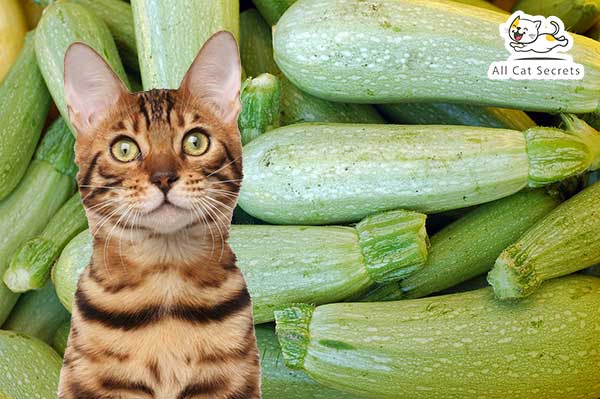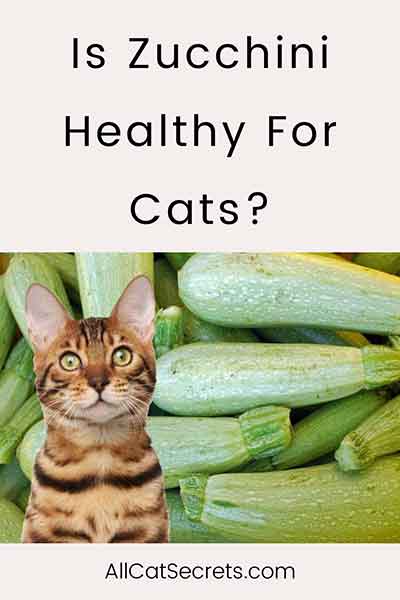Zucchini is a popular vegetable consumed in numerous homes worldwide. The vegetable packs several essential nutrients, including vitamins, minerals, and antioxidants. It’s also incredibly easy to incorporate into our diets.
However, most of the studies investigating the health and nutritional benefits of zucchini seem to focus on human consumption. So, as a proud cat owner, it’s important to establish zucchini’s benefits for your feline friend before feeding this vegetable to him.
As you might already know, many foods considered yummy and nutritious for humans have proven unpalatable and toxic for cats. But where does that leave zucchini? Can cats eat zucchini?
The short answer is yes. There are many vegetables considered toxic for cats. Fortunately, zucchini isn’t one of them. So, you can share zucchini with your adorable kitty without expecting any immediate medical emergencies. Besides being non-toxic to cats, zucchini also abounds in minerals and vitamins that might benefit your feline housemate.
But when it comes to cats and plant-based foods, there are always dangers to be wary of. In this post, we offer a comprehensive analysis into the possible benefits and adverse effects of zucchini for cats.
Table of Contents
What Is Zucchini?
Zucchini, also known as courgette or baby marrow, is a summer squash that belongs in the Cucurbitaceae plant family. That’s the same family that produces melons, cucumbers, and spaghetti squash.
The fact that zucchinis are squashes could imply that these fruits also trace their origin in the Americas, the same region where squashes originated from. But courgettes have a rather interesting history. This particular squash first appeared in Milan, Italy in the early 1800s.
Zucchinis are widely considered as vegetables. However, these vining herbaceous plants are botanically classified as fruits.
Courgettes can grow to over 3.2 feet (1 meter) in length. But despite their enormous size at full maturity, these fruits are commonly harvested way before their maturation period – typically when they’re under 8 inches (20 centimeters).
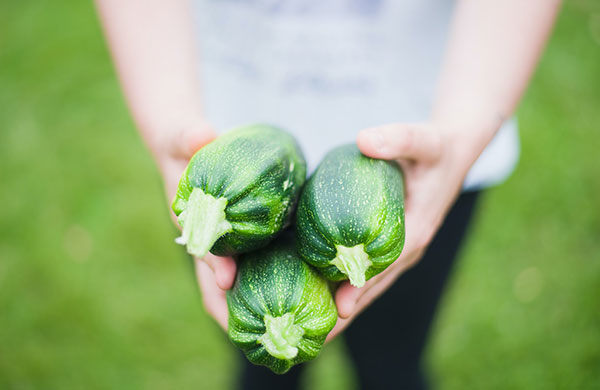
The reason baby marrows are harvested prematurely is that their immature seeds and rind tend to be softer and more palatable then.
Like most vegetables, courgettes occur in different varieties and cultivars. These variants differ across several parameters, including their geographical spread, maturation period, yield volume, and color.
Zucchini colors can range from deep yellow to dark green. Most common varieties are green, whereas exotic cultivars are deep yellow or orange.
Zucchini may be famous mainly for its culinary benefits. But the plant has been part of folk medicine from time immemorial. As an ancient therapeutic herb, baby marrows were widely used in treating various medical conditions, including colds and aches.
Potential Health Benefits of Zucchinis for Cats
One cup (223 grams) of cooked zucchini contains the following nutritional properties;
- Calories – 17
- Protein – 1 gram
- Carbohydrates – 3 grams
- Sugar – 1 gram
- Fiber – 1 gram
- Fat – less than 1 gram
- Water – 93 grams
- Vitamin A – 40% of the recommended daily intake (RDI)
- Vitamin B1 (Thiamin) – 5% of the RDI
- Vitamin B6 (Pyridoxine) – 7% of the RDI
- Vitamin B9 (Folate) – 8% of the RDI
- Vitamin C – 14% of the RDI
- Vitamin K – 9% of the RDI
- Manganese – 16% of the RDI
- Potassium – 13% of the RDI
- Magnesium – 10% of the RDI
- Copper – 8% of the RDI
- Phosphorus – 7% of the RDI
The above serving of courgette also contains calcium, iron, zinc, and several other B vitamins in trace amounts.
However, note that the recommended daily intake values are based on human consumption. Which begs the question, can cats have zucchini?
Yes, cats can still enjoy many of zucchini’s vitamins and minerals. Listed below are the specific ways your feline friend might benefit from this nutrient-rich vegetable.
- High protein cat food dry formula with real chicken as the first ingredient
- Natural with prebiotic fiber nourishes specific intestinal bacteria for digestive health
- Wholesome cat food dry kibble with vitamin A and Omega-6 fatty acids to nourish skin and coat
Last update on 2025-04-01 / Affiliate links / Images from Amazon Product Advertising API
1. Zucchinis May Aid Your Cat’s Digestion
Zucchini may not be as high in dietary fiber as many other vegetables. But its fiber content is still sufficient enough to support your cat’s digestive health.
Dietary fiber is divided into both soluble and insoluble fiber, with each type playing a crucial role in aiding digestion.
Soluble fiber provides the nutrients required by the beneficial microorganisms inhabiting the alimentary canal, scientifically known as gut microbiomes. Multiple studies have shown that keeping these organisms healthy is a proactive way to minimize the risks of digestive disorders.
On the other hand, insoluble fiber produce stool-bulking effects. That’s because this fiber generally moves through an animal’s stomach undigested. Bulkier stools increase bowel activity. And the more frequently your cat empty’s his bowels, the lower the risks of him becoming constipated.
2. Zucchinis May Promote Hydration
Over 90% of raw and boiled zucchini comprises water.
That makes zucchinis one of the best supplementary foods for cats that don’t drink enough.
It’s even better, considering that felines are generally fussy drinkers.
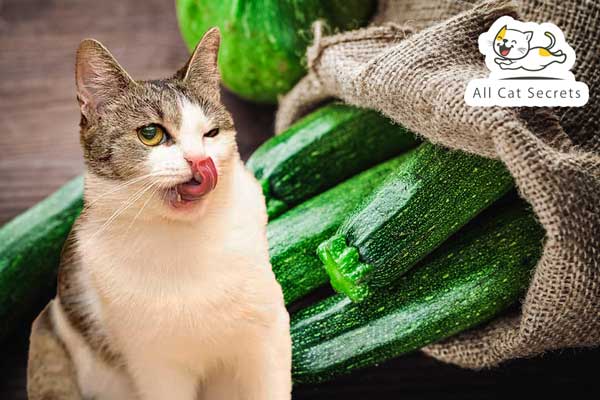
3. Zucchinis May Support Weight Loss
Worried that your feline friend is stacking up more pounds around his belly? Then you might want to supplement his diet with zucchini.
Zucchini’s weight loss benefits are mainly attributable to the high water and relatively high fiber content in these veggies.
Water and fiber have one thing in common – an ability to induce sensations of fullness while maintaining those feelings for longer. Dietary products rich in these two nutrients, such as courgettes, can help reduce the amount of foods your cat consumes in a single sitting while also curbing the animal’s food cravings. That combination is perfect for weight loss.
What’s more, zucchini is remarkably low in calories and fat. It’s one of the few vegetables you can safely feed to your cat without worrying about your feline friend becoming obese.
4. Zucchinis May Improve the Health of Your Cat’s Heart
Zucchini’s abundance in dietary fiber might also help support the health of your cat’s heart. Studies have shown that one particular soluble fiber in zucchinis, known as pectin, may promote a healthy heart by reducing “bad” LDL cholesterol levels.
Courgettes are also high in potassium, a nutrient famous for its vasodilatory properties.
Vasodilators are substances that expand constricted blood vessels. This phenomenon can help reduce blood pressure, further keeping stroke and heart disease at bay.
5. Zucchinis May Boost Your Cat’s Vision
Baby marrows are high in vitamin C and beta-carotenes, as well as the antioxidants lutein and zeaxanthin. These compounds can boost your cat’s vision. They’re particularly effective against eye damage caused by cataract and macular degeneration.
In addition to strengthening your cat’s visions, the antioxidants in zucchini may work synergistically to lower the risks of various chronic diseases. Examples include heart disease, diabetes, and certain cancers.
The following are additional potential benefits of zucchinis for cats, based on the other nutrients in the vegetable;
- Vitamin B1 – Supports metabolism and nerve functions.
- Vitamin B6 – Reduces nausea, anxiety, and risks of certain diseases like anemia.
- Vitamin B9 – Helps in the synthesis of genetic materials, including DNA and RNA.
- Vitamin K – Plays a key role in blood clotting and bone metabolism.
- Manganese – Aids the formation of connective tissues and bones, as well as sex hormones and clotting factors.
- Magnesium – Boosts muscle performance while also supporting various biochemical reactions.
- Copper – Works synergistically with iron to promote the synthesis of red blood cells. It also supports the blood vessels, bones, and nerves.
- Phosphorus – Involved in the formation of bones and teeth, as well as the maintenance and repair of cells and tissues.
- DOG SKIN AND COAT SUPPLEMENT: Loaded with Omega-3 fatty acids, this skin and coat supplement for dogs and cats supports your pet's...
- NATURAL IMMUNE SUPPORT: The EPA and DHA in our dog supplements formula fortify the immune system, supporting health and wellness...
- FOOD TOPPER: This liquid formula is suitable as a dog and cat food topper. For pet parents looking for an alternative to capsules,...
Last update on 2025-03-31 / Affiliate links / Images from Amazon Product Advertising API
Is Zucchini Healthy for Cats?
We’ve just outlined numerous health and nutritional benefits of zucchinis. Based on these benefits, it’s logical to conclude that zucchini is perfectly healthy for cats.
But as we mentioned at the beginning, there are always dangers to watch out for when it comes to feeding plant-based products to cats. In the following section, we unpack some of the things that could go wrong by giving your cat baby marrows.
Risks of Zucchini for Cats
1. Stomach Upset
Eating zucchinis may not trigger immediate medical emergencies in cats. But it’s worth noting that cats are obligate carnivores. Their stomachs are more adapted to digesting animal-based products, particularly meat and bones.
So, while zucchinis are free from compounds known to be immediately toxic to cats, feeding this vegetable to your feline friend may still present side effects.
Like most plant-based products, zucchini side effects in cats generally manifest as symptoms of stomach upset, including nausea, vomiting, diarrhea, reduced appetite, and abdominal pain.
2. Allergic Reactions
Many human foods are infamous for causing allergic reactions in cats. But are cats allergic to zucchinis?
The good news is that zucchini allergies in cats are generally unheard of.
However, the fact that zucchini allergies in cats are uncommon doesn’t make them entirely impossible. As a responsible pet parent, it’s always prudent to keep your eyes out for any allergic reactions when giving your pets unfamiliar foods.
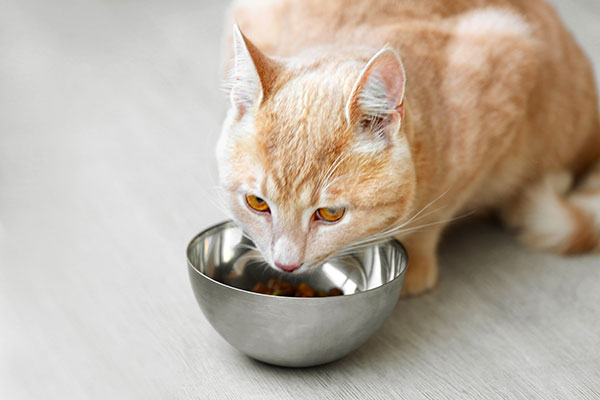
In fact, courgettes are high in a protein called profilin, known to induce allergic reactions. The plant also produces natural steroids called cucurbitacins, which might prove toxic if overeaten.
Common symptoms of zucchini allergy in cats to watch out for include inflammation, skin rash, itching, fever, elevated heart rate, and labored breathing. The animal may also exhibit certain unusual behavioral symptoms, such as withdrawal and inexplicable aggression.
Another thing worth noting is that the severity of zucchini symptoms for cats depend on several factors. Common ones include;
a. Quantities Eaten
The more the amount of zucchinis your cat consumes, the higher the risks of side effects. This begs the question, how much zucchini can cats eat?
Well, there’s really no standard measure on the amount of zucchini to offer your cat. The most important thing is to follow the fundamental rule of moderation.
Cats should only consume zucchini as an occasional treat. Never should the fruit replace your kitto’s main diet.
Even if your cat develops a love affair for baby marrows (which as you shall find is quite unusual), it’s still paramount that you moderate the animal’s intake of this vegetable.
b. Age
When it comes to feeding unfamiliar foods to cats, research has shown that kittens and senior cats generally produce similar reactions. But the reasons for this phenomenon may be a bit different.
The main reason younger cats may exhibit more severe side effects from eating courgettes is that their stomachs are more sensitive; hence, less effective at handling plant-based foods. As for older cats, it’s usually a question of age-related decline in immunity.
Perhaps you’ve always wondered, can old cats eat zucchini?
Old cats shouldn’t eat zucchini. And neither should kittens.
- CONTAINS: This pack of Delectables Squeeze Ups contains 32 (0.5 ounce eaches) squeezable cat treat tubes.
- INTERACTIVE TREATING: Squeeze Ups provide the purrfect bonding experience between you and your cat – this playful & interactive...
- PUREE TREATS: Each lickable treat tube is stuffed with a thick and creamy puree treat that is made from real poultry and fish.
Last update on 2025-03-31 / Affiliate links / Images from Amazon Product Advertising API
c. Breed cum Activity Levels
Smaller cat breeds tend to be more hyperactive than their larger counterparts.
Hyperactivity usually translates to higher metabolism. And a higher metabolic rate means that the zucchinis eaten will move faster through the digestive system.
All other factors held constant, physically inactive cats should generally avoid courgettes.
d. Tolerance and Sensitivity
The tolerance and sensitivity of baby marrows (or any other plant-based foods) for cats depends primarily on whether the animal has consumed this vegetable before.
Your cat will present more severe side effects of zucchini if he’s snacking on this vegetable for the first time. The contrary is true for cats who’re already familiar with courgettes.
e. Health Condition
Cats with a depressed immunity shouldn’t eat zucchinis. That ranges from sick cats and cats recovering from surgical procedures to pregnant cats and even nursing cats.
Zucchinis may be loaded with folate which might prevent birth defects and vitamin B6 known to reduce nausea among pregnant cats. However, the potential adverse effects of zucchinis for pregnant cats far outweigh the benefits.
Can cats with kidney disease eat zucchini? What about diabetic cats, can diabetic cats eat zucchini?
The fact that cats with diabetes and kidney disease fall within the broader category of ‘sick cats’ mean they shouldn’t eat zucchini. That’s especially true for processed courgettes, which could contain significant amounts of salt, sugar, fats, and spices.
Salt consumption might lead to sodium-ion poisoning, a life-threatening disease that mainly attacks your cat’s kidneys. Sugar is associated with diabetes and blood pressure issues, whereas fat can induce weight gain and aggravate symptoms of obesity and pancreatitis.
Lastly, spices like onions and garlic could trigger Heinz-body anemia, a medical condition characterized by a continued destruction of red blood cells.
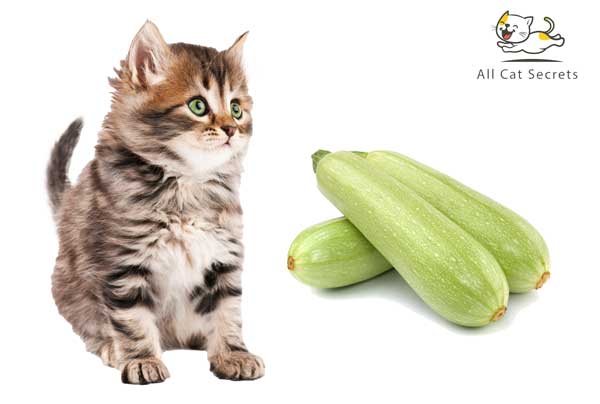
Do Cats Love Zucchini?
All cats are not made equal. Some cats may find courgettes fascinating, whereas others may develop an instant liking for these vegetables.
Perhaps the more pertinent issue to address here would be why cats generally find baby marrows spooky.
So, why are cats afraid of zucchini?
The main reason many cats are scared of zucchinis is that these vegetables resemble a snake, which cats are known to fear.
Another reason your cat may be frightened by courgettes is that the animal may not understand the purpose of this vegetable.
Last but not least, cats who’ve had horrible experiences with zucchinis will certainly find these veggies repulsive.
Can Cats Have Raw Zucchini Or Should I Cook The Vegetable First?
Cats enjoy their staple diet of meat raw and cooked. But does the same apply to fruits and vegetables? Can cats eat raw zucchinis?
Cats can definitely eat raw zucchinis. Feeding raw courgettes to your feline friend allows the animal to benefit from a maximum number of nutrients in the vegetable, including those like vitamin C whose potency tends to reduce after cooking.
The best way to feed raw zucchinis to your cat is to wash the vegetables thoroughly. This helps to remove any cling-on debris and chemical residues, including pesticides and insecticides.
After washing your zucchinis, the next step is to slice them into bite-sized portions. Remember that cats do not chew their food properly and prefer to swallow it whole. Slicing the courgettes into smaller pieces helps reduce choking risks.
Can cats eat cooked zucchini too?
We’ve just mentioned that cats can eat both raw and cooked zucchini. But if compared side by side, cats are probably better off eating cooked courgettes than raw ones.
The main reason for cooking zucchini before feeding it to your cat is that cooked courgettes tend to be softer, hence easier to digest. Cooking can help soften harder zucchini fruits, such as those which were harvested late. Cooking also increases the levels of certain vitamins in zucchini, such as vitamin A.
But perhaps the most important thing here is to know how to cook zucchini for cats. While there are several ways to cook baby marrows for human consumption, there are only a handful of cooking methods considered safe for cats. The convention is to shun all cooking methods that involve the use of salt, fats, and spices.
That begs the question, can cats eat fried zucchini?
Cats shouldn’t eat fried zucchinis because frying often involves the use of too much fats, the same that cats shouldn’t eat.
Can cats have grilled zucchini?
Cats can eat grilled zucchinis provided that no spices are used.
Can cats eat baked zucchini?
Baked zucchini is safe for cats as long as it contains all feline-friendly ingredients.
Can cats eat zucchini bread?
Regular bread is usually high in carbohydrates, which makes it potentially harmful for cats. But zucchini bread can still be prepared using cat-safe ingredients, in which case you can freely give it to your kitto.
What’s the best way to cook zucchinis for cats then?
Boiling and steaming are the safest methods to cook courgettes for your feline friend. That’s because these cooking methods help to preserve the beneficial minerals in these vegetables. Just remember to avoid salts, spices, and fats.
How to Feed Zucchini to Your Cat
There are several precautions to take while feeding zucchinis to cats.
First, insist on zucchini flesh. Shun the seeds, skin, and other harder parts of the plant.
Maybe you’ve always wondered, can cats eat zucchini skin or can cats eat zucchini with skin? And what about the leaves, can cats eat zucchini leaves?
Zucchini skin, leaves, and seeds all share one thing in common – they’re potentially harder for cats to digest. Therefore, always stick to the softer courgette flesh.
The following are other precautions while feeding zucchini to cats;
- Wash the zucchini thoroughly
- Slice the vegetable into bite-sized pieces
- Although you can feed raw zucchini to cats, you’re better off cooking the vegetable
- Avoid adding salt, fats, or spices
- Serve the vegetable to your cat sparingly
Conclusion
Zucchinis are not only safe, but also nutritionally beneficial to cats. But as with any plant-based products, it’s recommended to feed courgettes to your kitto in moderation.
Checkout Our Favorite Cat Products
1. Best Online Course For Cat Parents
Our favorite: The Cat Language Bible (How to Finally Understand And Speak to Your Cat) – A new form of cat to human communication that many cat owners have dreamed about… but few have actually thought possible.
2. Best Immune Support For Cats
Our favorite: Tomlyn Immune Support – Best Supplement for Cats and Kittens.
3. Best Cat Treats
Our favorites: LIFE ESSENTIALS All Natural Freeze Dried Chicken And Sheba Meaty Tender Sticks – Both are Great.

